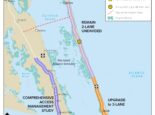$500M Mid-Currituck Bridge
Despite having no financial plan to build the bridge, or the required permits, the North Carolina Department of Transportation is pushing ahead with plans to build a $500M seven-mile toll bridge across the Currituck Sound to the northernmost section of the Outer Banks. An outdated and unnecessary project first proposed decades ago, the Mid-Currituck Bridge resurfaced as a toll project. Critically, plans for the bridge failed to look at current science and projections of sea level rise. An up-to-date analysis shows that roads around the bridge will become inundated and unusable long before the pricey project has paid for itself.
The bridge would bring a host of problems, including:
- Further beachfront development in an area already vulnerable to erosion, hurricanes, rising sea levels, and other threats likely to become more severe as a result of climate change;
- Damage to water quality critical to residents and aquatic habitat in the Currituck estuary critical to fisheries; and
- Thousands more vehicles and traffic on the beaches of the Currituck National Wildlife Refuge.
The bridge would also put further stress on other nature preserves and natural heritage sites in the area that are vital not only to migratory birds and other wildlife but also to tourism as people seek destinations to enjoy nature and get away from it all.
Better alternatives
Residents and property owners along the route asked NCDOT to consider more affordable and less damaging solutions that would have less impact on taxpayers and on the area’s special landscape.
A focus of alternative solutions was easing the area’s peak congestion days, which are usually summer weekends, at drastically less cost to taxpayers and the environment than the proposed bridge and could be implemented much sooner.
Financial burden
The bridge would place an unnecessary burden on the North Carolina’s financial coffers. Tolls would be high—as much as $50 per vehicle—but would cover only a fraction of the bridge’s $500 million price tag.
In 2013, the Southern Environmental Law Center worked with a diverse coalition of groups from both sides of the political aisle to pass legislation that removed earmarked funding for the bridge and made it subject to a partially data-driven scoring system. Still, local politicians who insist the $500M bridge be constructed determined to set aside almost the entire transportation budget for North Carolina’s coastal region to construct the bridge. The net effect takes scarce funds needed for more pressing transportation needs, including needed improvements to stretches of NC 12 that frequently wash out.
Our state would be better served directing funding and resources to road improvements needed to improve resiliency in Eastern North Carolina rather than this wasteful, destructive bridge. This unneeded bridge wastes taxpayer money and encourages more high risk development in a part of North Carolina already vulnerable to rising sea levels and coastal flooding due to climate change.
Kym Hunter, SELC Litigation Director
Inadequate analysis
The Southern Environmental Law Center filed a lawsuit challenging NCDOT’s outdated and illegal analysis of the $500M bridge’s environmental impacts on behalf of the North Carolina Wildlife Federation and “No Mid-Currituck Bridge,” a group of citizens from Aydlet and Corolla, N.C.
In addition to failing to assess the project’s full impacts on the area and life, the litigation asserted that NCDOT’s analysis failed to consider more sensible and less harmful alternatives, such as improvements to existing roads and bridges. The litigation also contended that NCDOT failed to consider up-to-date projections of sea level rise from climate change.

